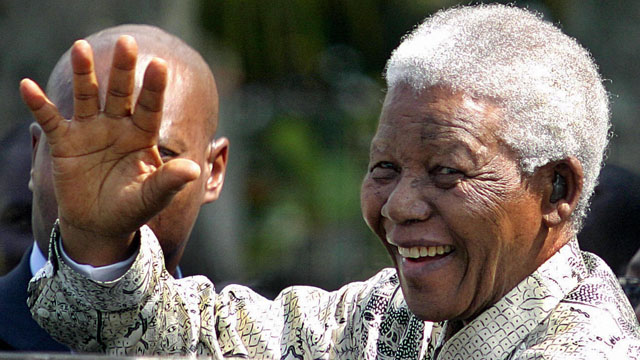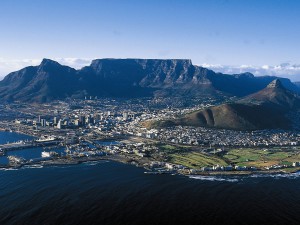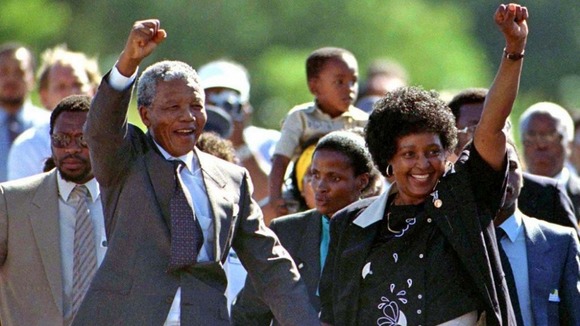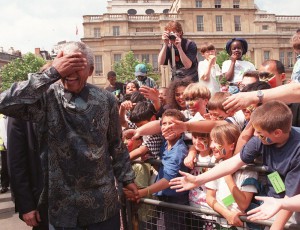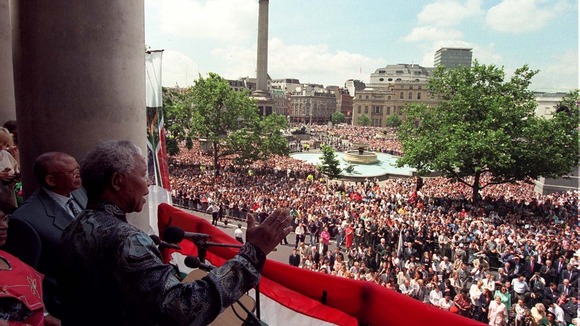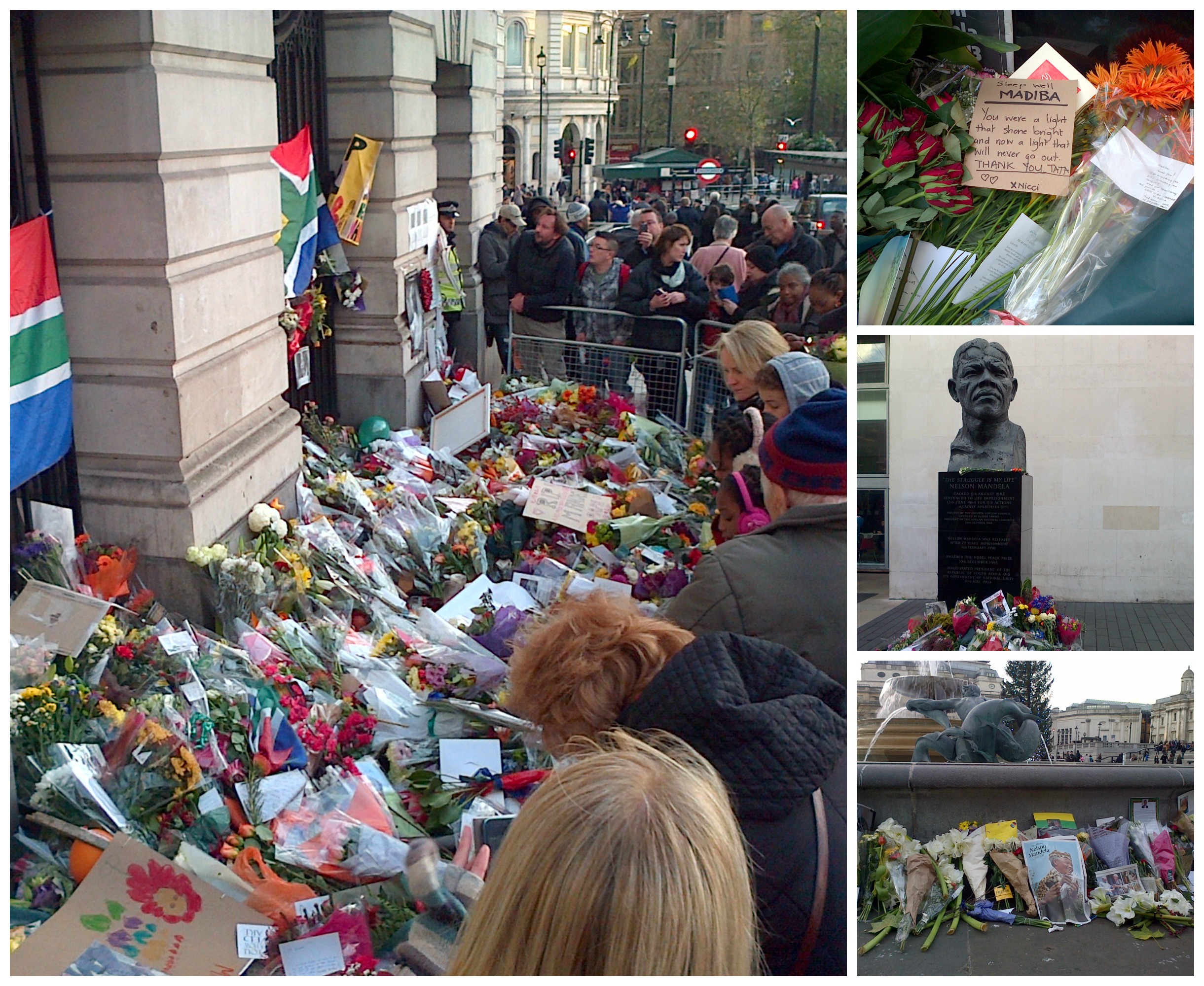The Day Mandela Came to Town
[photo: BBC]
It was a day in July a few years ago and one that had me jumping on a train from my home town in the Midlands, direction: London, to stand in Trafalgar Square. Me and a few thousand others.
I’d never done anything like this before – yes, I’d been in and out of London; at around 1½ hrs for the train journey or 2½ by coach, it was a ‘do-able’ journey for a day out – but as I sat there on the train, this was something different. Never before had I woken up and decided this was a day I had to be in London. So this journey was uncharted territory. A frisson of quiet excitement, possibly. An air of most likely being part of something truly historic. Equally, a touch of ‘can’t believe I’m doing this’.
The cause of this impromptu life moment? The State Visit of Nelson Mandela to the UK. An historic moment. Historic to welcome the first representative and democratically elected President of South Africa to the UK; the more so that that person was an individual who had become an icon for so many within and outside South Africa through the preceding decades; an almost mythical figure. It may well prove to be one of the most unique State Visits to this country. But why the impromptu moment for me?
South Africa calling!
Cape Town & stunning Table Mountain
A few months previously, I had escaped the winter cold of the UK to head to Southern Africa to travel and explore. Who wants to job hunt in a British winter! So, with a friend based in the region carrying out research, and an idle utterance ‘I should come out and visit’ made in a pub some months before, there I was walking down the steps of a plane in Cape Town in glorious 80+ degree heat. It was to be a totally enjoyable, fascinating, eye-opening three months through the ‘new’ South Africa and into neighbouring Zimbabwe. People, wildlife, landscapes. Incredible.
Hello Mr. Mandela
Whilst in Cape Town, I was strolling through the Botanic Gardens of the city on a certain day, the incredible sight of Table Mountain the ever-present backdrop. At one end, the Planetarium and its wonderful explique about the stars of the African skies; at the other, the streets of the main business district. Down one of the other sides, the back of the Parliament Buildings with the President’s Office next door (think the Capitol and the White House next door to each other). As I strolled through the gardens, there was an understandable huddle of people peering through the wrought iron gates that provided a view into the President’s back garden. Curiousity, of course. I headed over and, with the others in the huddle was witness to Nelson Mandela having an ‘elevenses’ stroll in his back garden with the visiting President of Namibia. Quite a moment, particularly given the immediate past history of the region and the two individuals concerned (but a very human one for the two men strolling). Next thing, the strolling Presidents had made their way to the gate and were chatting away with the huddle, Mandela in one of his tell-tale shirts and introducing his Guest. One vocal New Zealander later, and we were all shaking hands through the gate with Nelson Mandela. And this was the day it had just been announced he would be making a State Visit to the UK. What do you say to that? Literally, ‘see you in London Mr Mandela’.
So there I was, months later, back in the UK, on a train to London to ‘be there’.
How do we know the man?
Over recent days, the Press has been full of reports from South Africa; full of recollections of the life of Nelson Mandela. At age 95 and having been ailing for months, it has not been the shock it might have been at any other time, to hear of his death. It was his time. We can, I’m sure, be thankful that he enjoyed the latter years he did. Yes, headlines and accolades; the normal stuff of news, maybe, when an elder statesman of the world or a renowned public figure has died. Maybe the mark of how far the country of South Africa has come, is the seeming normality of such reports. Amidst these it might be easy to miss the remarkable, yet ordinary, man Mandela was; the astounding events he and others were part of and helped bring about. Appreciate those and you can easily reflect how he will remain such a towering figure in history, whilst also being a very human individual.
There will be those to whom he will simply be a name. There will be those to whom he is remembered as a President of a country called South Africa, a country with rather a colourful flag. There will be those who have lived through years, decades of news footage of civil strife in townships such as Soweto; of demonstrations by a population against its Government; of those demonstrations being put down quite brutally; of a population turning against itself; of international sanctions against a country, sporting boycotts; terms such as ‘apartheid’; a Government doing its best to justify a system that separated its population on racial grounds and governed accordingly; names such as Walter Sisulu, Oliver Tambo, Govan Mbeki, Nelson Mandela being known the world over but whose images were banned and who were names growing in myth from out of sight in a prison cell somewhere; an anthem banned; the ANC… It became known as ‘the struggle’. The protest movement would produce amongst other things, rock songs (‘Biko’ – Peter Gabriel; ‘Free Nelson Mandela’ – The Specials) and in the late 80’s rock concerts that filled the likes of Wembley Stadium in London. All with the intent to force South Africa to change its way.
Moment of history 1990 : release [photo: London Evening Standard]
And then, the seemingly intractable strife had one of those moments of history that come from nowhere. Nelson Mandela was to be released after 27 years in prison, many of them harsh. Negotiations would begin towards a multi-racial political future for South Africa. That was 1990. In 1994, the first non-racial and fully democratic elections took place. I recall driving to work here in the UK with radio reports of sunrise in South Africa and queues as far as the eye could see snaking their way to Polling Booths. Incredible and emotional stuff. The result: Nelson Mandela was to be President. A new dawn for a new South Africa. A new flag, a new anthem; international goodwill and South Africa the new place to be!
Elections 1994 [photos: London Evening Standard;BBC;BBC]
Hard years for a beautiful country
South Africa is a wonderful and fascinatingly diverse country. It was the South African Government of 1948 that introduced ‘Apartheid ‘– a system that would tear a wonderfully multi-cultural country apart; a ‘divide and rule’ on racial grounds. You were colour-coded; the wrong colour in the wrong neighbourhood and you would be cleared out and dumped in an unconstructed township on the outskirts; you were required to carry a ‘pass’ that declared where you could and could not be. The heart of Cape Town was ripped out on such a policy; vibrant neighbourhoods bulldozed. Against this, grew the African National Congress whose belief was simply that Africa was there for all to share and benefit from for the betterment of the nation as a whole. It’s anthem, ‘nkosi sikele iAfrica’, banned and treasonous to sing, was simply a prayer to Africa: ‘God Bless Africa..’. Mandela and the others who would lead the movement through the years of strife, would hold to their principles; would face treason trials and a potential death sentence; face imprisonment for life and be declared ‘terrorists’; and would face the personal cost of being separated from their families and knowing that their families, at the same time, would be facing harassment by the State.
They may well have become an irrelevance given their years of imprisonment. They could easily have regained their freedom embittered by what they had faced, with further tragic consequences for the country. By the time of their release, South Africa was a tinderbox.
A ‘Rainbow Nation’ looking to the future
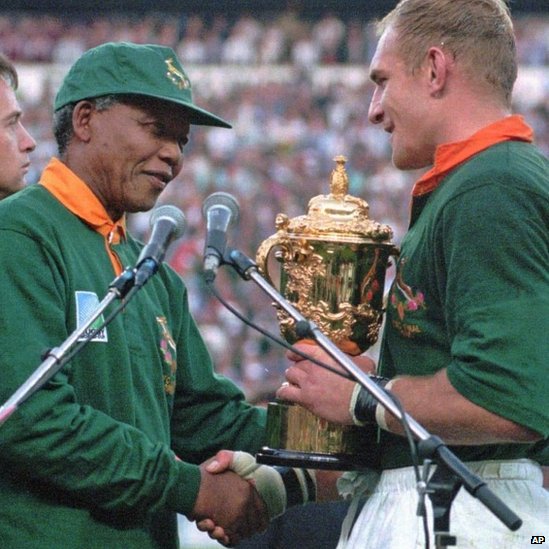 Their magnitude, which can easily be lost in the headlines, was simply a lack of bitterness. A belief in a positive future for the country; a desire to stick to their beliefs in order to forge what became termed a ‘rainbow nation’. And this was the way Mandela and his fellow leaders moved forward. During the 1995 Rugby World Cup, held in South Africa, Mandela walked onto the pitch to greet the teams, wearing the rugby jersey of the Captain of the national team, the Springboks. The sport traditionally associated with the white afrikaaner population (with all of its political overtones) was being embraced for the nation by Mandela. To a sports-mad nation, what greater symbol of reconciliation could be made. South Africa went on to win the World Cup, it is said, inspired by that gesture.
Their magnitude, which can easily be lost in the headlines, was simply a lack of bitterness. A belief in a positive future for the country; a desire to stick to their beliefs in order to forge what became termed a ‘rainbow nation’. And this was the way Mandela and his fellow leaders moved forward. During the 1995 Rugby World Cup, held in South Africa, Mandela walked onto the pitch to greet the teams, wearing the rugby jersey of the Captain of the national team, the Springboks. The sport traditionally associated with the white afrikaaner population (with all of its political overtones) was being embraced for the nation by Mandela. To a sports-mad nation, what greater symbol of reconciliation could be made. South Africa went on to win the World Cup, it is said, inspired by that gesture.
Mandela magic : Rugby World Cup 1995 [photo: BBC]
Whilst as President and following his one-term in Office, he and South Africa became mentors, in many ways, in showing the way in conflict resolution and in a way founded on African principles. The account of the ‘Truth and Reconciliation Commission’ process, chaired by Archbishop Desmond Tutu, is powerful and a highly recommended read: ‘No future without forgiveness’.
A July Day in London
In travelling to the UK, that July, Mandela’s wish was to thank the people of the UK for their support through the hard years – much of the anti-apartheid movement was based in the UK. Public Parks, Schools, Roads had been named in his honour through those years. So, from the balcony of South Africa House, fronting onto Trafalgar Square, Mandela was to greet a mass of humanity and speak publicly to give his thanks.
As the clock inched towards the time of his arrival, thousands filled every inch of Trafalgar Square, in the end overflowing into the surrounding streets, bringing central London to a halt. London hadn’t seen anything like it.
[photo: AP]
For all the iconography that had grown up around this person by the name of Nelson Mandela, here was a gentle, grey-haired senior gentlemen with a natty taste in shirts, gently walking through the crowd to give a speech.
Always a sense that his humanity was forefront. But always, even into his mid 70’s, burning within, the man who had been forced by circumstances to follow a path, of politics, of resistance, at great personal cost. And no sign of bitterness.
History made in London : speaking to the crowds in Trafalgar Square [photos:itv/Tony Harris PA]
It was a moment of history for us. And incredible to be in the midst of Trafalgar Square that day. His return to Buckingham Palace for afternoon tea with the Queen was no less remarkable – crowds lining the Mall and running alongside his car. These things just don’t happen here!
Long Walk to Freedom
It has been touching to see beneath the same balcony from which he spoke those few years ago, flowers and commemorations laid. In Parliament Square, the same at the foot of his statue – he is there, amidst some great figures of political history, both native and international. As also on the South Bank, in many ways more of ‘the people’s London’, at a bust of the man, erected during the anti-apartheid years.
Remembered with affection in London : the steps of South Africa House, Trafalgar Sq.; South Bank; Trafalgar Sq.
To read his autobiography, ‘A Long Walk to Freedom’ is to read a fascinating piece of recent history. It is to gain an insight into the many layered life that was lived. For all the accolades as a Statesman at the end of his life, he was a real person (and that includes the faults anyone can have) and yet also, faced with circumstances we will never likely have to face. Underpinning all, and never forgotten, was his heritage as a member of a tribal clan from his spiritual home in what is now the Eastern Cape Province of South Africa. It is to there, amidst the rolling hills at a place called Qunu, that he has returned.
